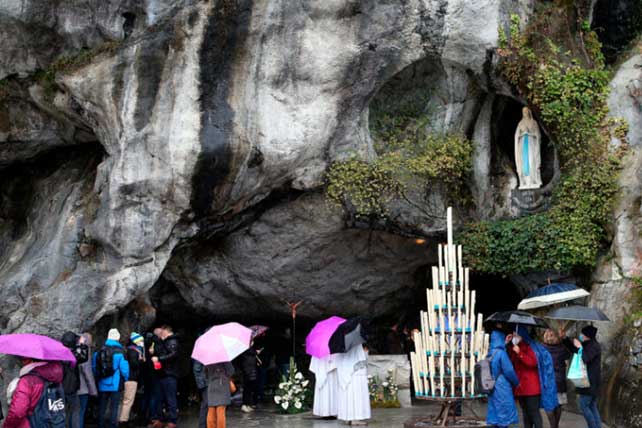Those guidelines were not officially available to the public until 2011, possibly in order to prevent people from reverse-engineering approved apparitions, Laycock said. Copies had been, however, leaked before then.
Pope Francis’ devotion to the Virgin Mary and his support for popular piety have both been main features of his pontificate. The pope was in the parish of Our Lady of Lourdes in his native Buenos Aires when he heard of the resignation of Pope Benedict XVI. Francis has said in interviews that a woman there yelled: “The Virgin of Lourdes will make you pope!”
But Francis has also been skeptical regarding alleged apparitions and miracles. He voiced doubts about what he described as the “Mail Lady Madonna” of the Shrine of Medjugorje, Bosnia and Herzegovina, where faithful believe the Virgin Mary appears to seers at specific hours since 1981. The popular Marian site never received the stamp of approval by the Vatican.
In 2018, the pope selected Emeritus Bishop Henryk Hoser to be a permanent papal representative and inspect the apparitions and financial management of Medjugorje. The pope eventually allowed the pilgrimages to continue, but without confirming the apparitions.
Marian merchandise for sale in Medjugorje, Bosnia and Herzegovina. (Photo by Sean MacEntee/Wikimedia/Creative Commons)
The pope’s desire to rein in the management of Marian sites became clear in May 2023, when he created a Pontifical International Marian Academy, a group of experts charged with investigating apparitions and the supernatural. When contacted by Religion News Service, the president of the academy, the Rev. Stefano Cecchin, said that due to past “slander” by Spanish and American journalists, “who became servants of Satan and consequently of Freemasonry (especially in North America),” he no longer speaks to the press.
Paolo Parigi, a sociologist and the author of “The Rationalization of Miracles,” said, “In general, the posture of the church authority toward (Marian apparitions) is much more skeptical than toward potential miracles from a saint.” The latter are evaluated through a separate formalized process.
“When someone has private revelation,” like witnessing a Marian apparition, “it’s up to the bishop, and this is very much by design,” said Laycock, explaining that the process of approving Marian apparitions is highly political.
“In Lourdes and Fátima, the church had good political reason to approve those apparitions,” Laycock said. In Portugal, the church was facing persecution by a new Portuguese government.

Pope Francis waves as he arrives at the Shrine of Our Lady of Fatima in Portugal, on May 12, 2017. (Photo by Nuno Veiga/Pool)
But in the U.S., Catholicism has been a minority religion and “viewed as a superstitious religion for immigrants,” Laycock explained.
“It’s not that people are not having private revelations in America. They are. But it’s that usually bishops regard them as an embarrassment,” he said, which means they avoid investigating or talking about them.
The sole approved Marian apparitions in the U.S., a series of apparitions to a young woman in Champion, Wisconsin, in 1859, only received that approval in 2010.
While it’s possible the Vatican document will make stricter rules for approving Marian apparitions, Laycock said he has seen traditionalist Catholics on social media expressing approval that the Vatican is taking the supernatural seriously. He also raised the possibility that the document might address exorcisms, saying that, based on his monitoring of U.S. social media, exorcisms are now a major source of private revelation among conservative Catholics.


